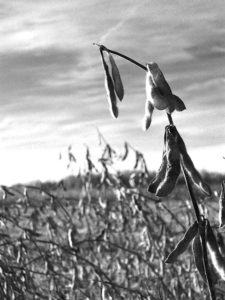

| Online: | |
| Visits: | |
| Stories: |

| Story Views | |
| Now: | |
| Last Hour: | |
| Last 24 Hours: | |
| Total: | |
Legislators Race to Stop Dicamba Devastation This Season
Cornucopia’s Take: Monsanto sold its dicamba-resistant seed to farmers prior to approval of the attendant herbicide. Dicamba is an older generation persistent herbicide linked to human health issues, and it is known for its propensity to widely drift away from the fields it is sprayed on. Conventional farmers, desperate to kill pesticide-resistant weeds in their fields, have been using dicamba, and it has damaged or destroyed crops being grown by neighbors. Farmers are suing Monsanto for the premature release of its new seed. In advance of the growing season, lawmakers are working to increase the fine for farmers using the controversial herbicide illegally. Dicamba is prohibited in organic agriculture.
Missouri, Arkansas take steps to prevent misuse of controversial herbicide
St. Louis Post-Dispatch
by Bryce Gray
 |
Crop damage from the last growing season is done, but Missouri and Arkansas lawmakers are taking steps that aim to prevent future devastation from dicamba, the herbicide widely blamed for a rash of illegal spraying that sowed financial pain and discord in farming communities across the region.
Arkansas set a bold example last week, when the state’s Plant Board passed restrictions that would only permit the use of certain types of dicamba and would only allow one variety to be applied from April 15 through Sept. 15 — when warm temperatures make the herbicide more susceptible to forming vapor and drifting to nearby fields, where it can damage any crops that aren’t genetically modified to tolerate it.
Interestingly, the variety approved for use throughout the growing season in Arkansas is Engenia, from chemical company BASF, and not Xtendimax, the new herbicide from Creve Coeur-based Monsanto. Xtendimax, which Monsanto has touted as being less volatile , was not approved for use by the Environmental Protection Agency until late 2016 even though the company started selling crop varieties resistant to the herbicide in 2015.
Despite its absence for two full growing seasons, many growers with dicamba-tolerant seed are suspected of spraying illegal alternatives not authorized for use. Drift from those “off-label” forms of dicamba is the presumed culprit behind scores of crop damage complaints in southeast Missouri, and is even believed to have incited deadly violence, with a Missouri man facing murder charges in the October shooting death of an Arkansas farmer just across the state line.
Under Arkansas’ new policy, Engenia will even be eligible for use on Monsanto’s dicamba-tolerant cotton and soybean varieties.
Monsanto responded to Arkansas’ new dicamba restrictions with disappointment.
“It is unfortunate that to this point, the state of Arkansas has not enabled farmer choice by fully approving all of the formulated products the EPA and 25 other states so far have permitted for in-crop use,” Monsanto said in a statement.
“Growers in Arkansas and across the United States need new tools and technologies to control weeds, and XtendiMax herbicide with VaporGrip Technology is an important new option.”
The company said state approvals generally “remain on-schedule,” and indicated that some states may implement training measures for the product. ”We’d like to see those programs implemented in conjunction with grower access to this technology for 2017,” the company said.
In Missouri, meanwhile, state Rep. Don Rone, R-Portageville, has introduced three bills aiming to avoid a repeat of the scenario that unfolded on farms across his Bootheel district last summer.
Rone last week introduced two bills that would amend the approval process for herbicides and herbicide-resistant seed in Missouri. One of them, House Bill 605, would require the Missouri Department of Agriculture to determine whether herbicides sold in the state are “inherently volatile” and develop usage restrictions for those meeting certain criteria. The other, HB 606, would prohibit the sale of herbicide-resistant seed if the corresponding herbicide has not also garnered approval.
But Rone described the legislation introduced Thursday as the biggest of the three. He said that bill, HB 662, would raise existing fines for illegal herbicide use from $1,000 per field to $1,000 per acre.
“The farmers down there have asked me to build something with teeth in it,” he said. “That’s what I’ve done.”
Farmers have criticized existing fines for being woefully insufficient to deter wrongdoers. Rone said he did not want to pursue restrictions like those implemented in Arkansas, arguing that growers need access to new herbicides.
”We tried our best not to stifle industry,” Rone said. “If we can keep the bad players from being bad players, we can use this compound. But we need things in place to show them we mean business.”
Rone is hopeful that toughened-up penalties on illegal herbicide use will come to pass, but recognizes that time is of the essence to help protect growers this year.
”I think it’ll pass but the issue’s gonna be getting it done in a timely manner before planting time,” he said.
The post Legislators Race to Stop Dicamba Devastation This Season appeared first on Cornucopia Institute.
Source: https://www.cornucopia.org/2017/01/legislators-race-stop-dicamba-devastation-season/


